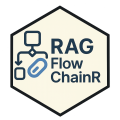
The hardware and bandwidth for this mirror is donated by METANET, the Webhosting and Full Service-Cloud Provider.
If you wish to report a bug, or if you are interested in having us mirror your free-software or open-source project, please feel free to contact us at mirror[@]metanet.ch.

RAGFlowChainR is an R package for Retrieval-Augmented
Generation (RAG) workflows with local retrieval backends
(DuckDB and VectrixDB) plus optional web
search.
The README is intentionally short. Full backend workflows are documented in vignettes.
install.packages("RAGFlowChainR")install.packages("remotes")
remotes::install_github("knowusuboaky/RAGFlowChainR")library(RAGFlowChainR)
rag <- create_rag_chain(
llm = function(prompt) "mock answer",
vector_database_directory = "my_vectors.duckdb",
method = "DuckDB",
use_web_search = FALSE
)
rag$invoke("What is RAG?")
rag$disconnect()For complete ingestion, indexing, and backend-specific setup, use the two backend vignettes above.
Sys.setenv(TAVILY_API_KEY = "your-tavily-api-key")
Sys.setenv(OPENAI_API_KEY = "your-openai-api-key")
Sys.setenv(GROQ_API_KEY = "your-groq-api-key")
Sys.setenv(ANTHROPIC_API_KEY = "your-anthropic-api-key")MIT (c) Kwadwo Daddy Nyame Owusu Boakye
These binaries (installable software) and packages are in development.
They may not be fully stable and should be used with caution. We make no claims about them.